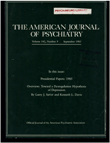A Latin American perspective on DSM-III
Abstract
The author examines some of the basic postulates and initial accomplishments of DSM-III from a Latin American vantage point. The phenomenological approach taken by DSM-III has enjoyed a long and prestigious tradition in Latin America. The author cites some of the difficulties posed by the personality disorders section, the exclusion of cultural criteria and psychocultural syndromes, and the practical inapplicability of the axis IV and V specifications for Latin American patients. DSM-III, however, is a challenging stimulus for Latin American and Third World psychiatrists and a real test for the influence and consistency of American psychiatry across the world.
Access content
To read the fulltext, please use one of the options below to sign in or purchase access.- Personal login
- Institutional Login
- Sign in via OpenAthens
- Register for access
-
Please login/register if you wish to pair your device and check access availability.
Not a subscriber?
PsychiatryOnline subscription options offer access to the DSM-5 library, books, journals, CME, and patient resources. This all-in-one virtual library provides psychiatrists and mental health professionals with key resources for diagnosis, treatment, research, and professional development.
Need more help? PsychiatryOnline Customer Service may be reached by emailing [email protected] or by calling 800-368-5777 (in the U.S.) or 703-907-7322 (outside the U.S.).



